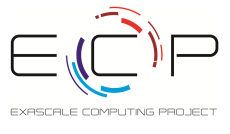Lab Staff Present at Exascale Computing Project Annual Meeting
Researchers Contribute Two Plenaries, Five Tutorials, 15 Breakouts and 20 Posters During Jan. 14-18 Gathering in Houston
January 8, 2019
Staff from Computing Sciences and other lab divisions will share their expertise in two plenary talks, five tutorials, 15 breakout discussion sessions and 20 posters at the 2019 Exascale Computing Project (ECP) Annual Meeting being held Jan. 14-18 in Houston. The meeting will highlight technical accomplishments being supported by interactions and collaborations within the ECP community, which encompasses the ECP focus areas, Department of Energy high-performance computing facilities and vendors.
Here is a look at lab contributors to the meeting program:
Plenary Talks
- Prabhat and Thorsten Kurth of NERSC are co-authors of "Exascale Deep Learning," a talk to be given Thursday, Jan. 17.
- Richard Gerber of NERSC will participate in Jan. 15 talk presenting "Update from the Facilities" about Office of Science computing centers.
Tutorials
- Quincey Koziol and Suren Byna of CRD are co-authors of a tutorial on "Exascale I/O Technologies"
- Mario Melara of NERSC is a co-author of a tutorial on Spack, an open-source tool for HPC package management
- NERSC's Shane Canon is a co-author of a session on "Container Computing for HPC and Scientific Workloads"
- Mustafa Mustafa, Steve Farrell and Prabhat, all of NERSC, are co-authors of a tutorial on "Deep Learning at Scale"
- Sam Williams of CRD and Charlene Yang and Jack Deslippe, both of NERSC, are co-authors of "Performance Tuning with the Roofline Model on GPUs and CPUs."
Breakout Sessions
Lab staff are contributing to many of the breakout discussion sessions where attendees can learn about important topics and areas in the ECP community. Presenters will be discussing accomplishments, requirements sharing and opportunities for interactions.
- David Donofrio of CRD will co-lead sessions on "Implications of Exascale Hardware Trends on Application Development" and "ECP Hardware Evaluation – Assessing the Characteristics of Exascale Class Machines"
- Nick Wright of NERSC is leading "Perlmutter - a 2020 pre-exascale GPU-accelerated system for NERSC"
- Kathy Yelick, Computing Sciences, and Lenny Oliker, Sam Williams, Aydin Buluç and Steve Hofmeyr, all of CRD, are co-creators of a session on " Architectural Challenges of Genomic Analysis"
- Rollin Thomas, Shane Canon and Kelly Rowland, all of NERSC, and Shreyas Cholia of CRD will present "Jupyter at HPC Centers"
- John Bell, Ann Almgren, Sam Williams and Andrew Myers, all of CRD and Kevin Gott of NERSC will present "AMReX and AMReX-based Applications"
- Aydin Buluç of CRD is co-author of a session on " Graph and Combinatorial Methods for Enabling Scientific Applications"
- Brandon Cook and Jack Deslippe, both of NERSC, will lead a breakout on "Preparing Applications for NERSC-9 (Perlmutter) as an Exascale Waypoint"
- Richard Gerber is a co-author of a session on "Software Sustainability for ECP and Beyond"
- NERSC's Mario Melara will co-host a Spack roundtable
- Taylor Groves of NERSC is a co-author of a session on "System-level architecture simulation for exascale: challenges and opportunities"
- Doug Doerfler of NERSC is a co-author of a session on "Portability at the Intersection of the Exascale Computing Project and the DOE Centers of Excellence"
- Tianzhen Hong of the Building Technology and Urban Systems Division is co-presenter in a session on "Modeling the Coupling of Climate, Urban Microclimate, and the Built Environment"
- Katie Antypas of NERSC and Eli Dart of ESnet are c o-authors of a session on "Supporting Complex Workflows from Experimental and Observational Facilities"
- Shane Canon and Cory Snavely of NERSC are co-contributors to a session on "Containers in HPC, and Beyond."
Posters
- David McCallen, Energy Geosciences Division, “Towards Exascale Simulations of Regional Earthquake Hazard and Risk
- Jean-Luc Vay, Accelerator Technology and Applied Physics Division, “AWarpX: Exascale Modeling of Plasma Particle Accelerators”
- Scott Baden, CRD, “Pagoda: Lightweight Communications and Global Address Space Support for Exascale Applications - UPC++”
- John Bell, CRD, “AMReX Co-Design Center for Exascale Computing”
- Suren Byna, CRD, “ExaHDF5: Delivering Efficient Parallel I/O on Exascale Computing Systems”
- Shreyas Cholia, CRD, “Interactive Supercomputing through Jupyter at NERSC”
- Phillip Colella, CRD, “FFTX, a new framework for building high-performance FFT-based applications for exascale machines”
- Marc Day, CRD, “Pele Suite of Codes for Transforming Combustion Science and Technology with Exascale Simulations”
- David Donofrio, CRD, “Node Level Simulation”
- Pieter Ghysels, CRD, “STRUMPACK -- STRUctured Matrix PACKage”
- Paul Hargrove, CRD, “Pagoda: Lightweight Communications and Global Address Space Support for Exascale Applications - GASNet-EX”
- Sherry Li, CRD,”SuperLU Sparse Direct Solver”
- Osni Marques, CRD, “Requirements Management via User Stories using Confluence and JIRA”
- Venkitesh Ayyar, NERSC, “The search for Dark matter by the LZ experiment using HPC resources at NERSC”
- Jan Balewski, NERSC, “Potential of quantum accelerators”
- Brandon Cook, NERSC, “Perlmutter: A Pre-Exascale System for the Office of Science”
- Rahulkumar Gayatri, NERSC, “Performance Portability Case Study”
- Jonathan Madsen, NERSC, “Tomographic Reconstruction on the GPU with TomoPy”
- Laurie Stephey, NERSC, “Optimizing DESI's Python data processing on Cori at NERSC”
- Yunsong Wang, NERSC, “Optimization of ATLAS simulations on Cori.”
About Computing Sciences at Berkeley Lab
High performance computing plays a critical role in scientific discovery. Researchers increasingly rely on advances in computer science, mathematics, computational science, data science, and large-scale computing and networking to increase our understanding of ourselves, our planet, and our universe. Berkeley Lab’s Computing Sciences Area researches, develops, and deploys new foundations, tools, and technologies to meet these needs and to advance research across a broad range of scientific disciplines.







 Instagram
Instagram YouTube
YouTube